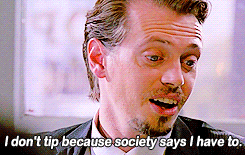 A proposed federal rule change that would allow owners of restaurants, bars and other businesses whose employees receive tips to distribute those gratuities as they see fit would add flexibility for employers—but might raise questions in the minds of customers.
A proposed federal rule change that would allow owners of restaurants, bars and other businesses whose employees receive tips to distribute those gratuities as they see fit would add flexibility for employers—but might raise questions in the minds of customers.
Those who agree with the Mr. Pink character from “Reservoir Dogs,” who famously refused on principle to tip a diner waitress in the movie’s opening scene, would have a whole new set of arguments to make about which jobs society deems to be tip-worthy.
Currently, a 2011 Obama-era Department of Labor rule mandates that tipped workers get to keep the 15 percent or 20 percent that’s added to the credit card receipt or stacked under the salt shaker. The rule change would allow management to pool these tips and spread the wealth more evenly, including traditionally non-tipped staffers like dishwashers and cooks.
However, the change—which would not impact businesses paying less than minimum wage and making up the difference with tips—also would enable the thousands of employers who do pay at least minimum wage to collect these tips themselves. They could use them for any other business purposes as they see fit, such as roof repairs, purchasing new kitchen appliances or even to beef up the menu, according to legal experts.
For this reason, an estimated 500,000 workers could lose their tips under the plan, according to the office of Illinois Attorney General Lisa Madigan, who is one of 17 state attorneys general to file a formal complaint with the Department of Labor sharply questioning the ins and outs of the proposal.
The 800,000-member Illinois Restaurant Association agrees with the proposal generally but has expressed opposition to management and other non-hourly staff sharing in the tip pool. And even restaurant and bar patrons who disagree with Mr. Pink traditionally have understood that tips go to the person providing a direct service.
So it’s hard to say how their tipping behavior might be affected if they don’t know where that 15 percent or 20 percent is going. In making its determination, the Department of Labor is weighing the more than 270,000 comments it received during the recent open comment period, many of which made it clear that they do not consider management to be tip-worthy.
 Chicago Business Attorney Blog
Chicago Business Attorney Blog

